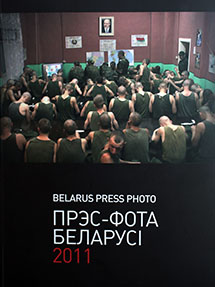Thursday’s court ruling in the western Grodno region of Belarus is not befitting a modern European country, where servants of justice–prosecutors and judges–are expected to ensure protection for press freedom and human rights. Instead, it is reminiscent of medieval Europe, where dissent was declared heresy and ordered destroyed.
The Oshmyansky District Court ruled that the 2011 edition of the Belarus Press Photo album contained extremist materials that “deliberately contort” social, economic, and political life in the country. Belarus Press Photo is an independent press photography contest that aims to support, promote, and develop local photojournalism, according to its mission statement.
The court ordered that all 41 copies of the album confiscated from the contest organizers in November be destroyed, and that two contest organizers and one of the finalists must each pay 217,500 Belarusian rubles (about US$25), in fines and litigation costs, local press reported.
According to the independent news website Charter 97, Belarusian customs officers confiscated the albums from Yulia Doroshkevich, contest organizer, late last year as she was returning home from neighboring Lithuania where the albums were on exhibit. The customs officials passed the albums to the KGB security service, which first commissioned a review of the photos by a team of so-called experts–among them a regional government official and three university instructors–and then used the findings to seek a court ruling against the publication, Charter 97 reported.
The experts, who were tasked with reviewing both pictures and captions, wrote in their conclusion, according to the independent news website Naviny:
The general analysis of photographs and captions contained in the reviewed publication demonstrates a deliberately contorted presentation of information and facts on the actual state of political, economic, and social spheres of activity of state organs, as well as legal and economic status of the citizens of the Republic of Belarus. Besides, the album as a whole depicts only negative aspects of Belarusian people’s daily activities described by the personal assumptions and conclusions of the authors, which from the point of view of the accepted social norms and good morals also humiliates national honor and dignity of the citizens of Belarus.
The experts concluded that the images–some of them portraying sporting events, President Aleksandr Lukashenko’s televised address to the nation, anti-government protests, and the daily life of ordinary citizens–violated national anti-extremism legislation, and should be banned.
Photojournalists and their supporters, including the Minsk-based press freedom group Belarusian Association of Journalists (BAJ), denounced the ruling and said they will appeal.
“We hope that the ruling will not be enforced and that Belarus does not end up on the blacklist of countries where authorities ban and destroy pieces of art,” BAJ said in a statement. “We also hope that Belarusian journalists will continue carrying out their professional duties and ignore state ideologists’ will to depict Belarusian reality in rose colors.”
CPJ joins our partner group, and appeals to the judges to be guided by reason and the law–as well as their understanding of the tragic consequences the ruling could have on the future of art, in addition to photography, in Belarus. After all, we live in the 21st century, not medieval times.
